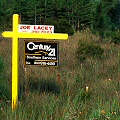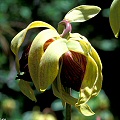Q: Why can't I collect plants if the land they live on is being destroyed anyway?

Build! Build!
A: I grant you, if I were exploring a carnivorous plant site and I saw
the area was in the act of being destroyed, I would certainly contact
the site foreman and ask for permission to collect on that site. Then
I would take every damn plant I could find and distribute them to
other growers. I would also contact every sympathetic person I knew
to help me.
But that cartoon scenario rarely happens.
What more often happens is that I am at some carnivorous plant site
and see "For Sale" signs on the land (at prices I
certainly cannot afford). There might even be signs saying that a
new mall, etc., will soon be built on that very site. This is not yet a
case that justifies field collection. Why? Because how do you know
what is planned for those plants? Probably they are going to be killed.
But it is very possible that a rescue mission through a land
restoration group (local carnivorous plant society, botanical garden,
or land management agency) already has plans to salvage those plants.
Before you go digging, it is your legal and moral responsibility to
contact the land owners. It is also possible that the very people
who are buying the land are going to save it for the value of the
natural habitat!
Again, the rosy scenarios I suggest above are unlikely. In all probability, the plants are doomed. But you
don't know for certain, do you? I you are going to "rescue" the plants, make for damned sure
you are doing the right thing.

Don't collect me!
Let me tell you a story about something I did once.
I was visiting a Darlingtonia pitcher plant site and found that it was
going to be
logged. I tracked down the owners and talked to them about the site's natural values. I talked to their forester. I talked to the
people responsible for reviewing the timber harvesting plan. I solicited
faxes, phone calls, and letters from the internet. In the end,
acting as an agent of the International Carnivorous Plant Society I was able
to help influence the drafting of the harvest plan to spare the site. This kind of activity
is vastly more productive than just shrugging and ripping a few plants out of
the ground for a private collection.
Could you imagine what my righteous
fury would have been if I discovered collectors tramping about the site
and poaching plants during this time, citing logging as an excuse for their
behavior?
I would have buried their bodies in the peat---downstream of course,
since I would not want to affect the nutrient load leaching into the bog.
Decaying bodies have a lot of nutrients in them, so I have discovered. I mean,
so I am told.
So be careful where you collect, even if it seems apparent the
land is going to be destroyed.
Page citations: Rice, B.A. 2006a; personal observation.